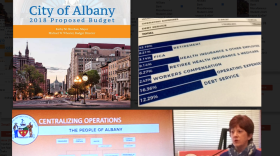At City Hall on Monday, Albany Mayor Kathy Sheehan presented a proposed 2018 budget that once again hinges on $12.5 million in Capital City funding from the state.
The mayor's office touted the fact that the $176 million-dollar package (which comes with a slight tax increase) includes a half a million dollar decrease over 2017's spending plan – the first consecutive budget decrease in over 60 years. Mayor Sheehan: "You know a budget ultimately is a policy document. A budget talks about and speaks to the priorities that we have as city government. And while we focused on ensuring that we're effective and we're efficient, I can sometimes become a bit wonky and talk about numbers, we really just have to go back to the why. And the why that we are doing this is so that we can continue our equity agenda so that we can continue to rebuild neighborhoods, and so that we can continue to focus on making investments that are going to strengthen our neighborhoods, that're going to strengthen our communities, and that are going to allow our city to continue to move forward."
It’s a time of transition in city government following the key Democratic primary in September. The general election is set for November, with a new common council to be sworn-in in the new year. Current representatives, including the 11th ward's Judd Krasher, have been reviewing Sheehan's budget. "In the budget are raises, for mid-level and top-level management. These are folks in city government that are already making six-figure salaries. That's unacceptable, on many fronts. First of all, the city of Albany was recently named the most fiscally-stressed city in the state of New York. That's no time to be giving out raises to mid-level and top-level management. Furthermore, it's awfully difficult to tell a family in the 11th ward or anywhere in the city of Albany for that matter, who's on a fixed income, struggling to pay their bills as it is, including a trash fee, which is still baked into this budget, to shoulder an additional increase in their taxes to in part pay for raises for individuals already making very high salaries."
The budget follows guidelines set by both the PFM Report and State Comptroller Tom DiNapoli's recent report Krasher cited that found Albany in dire financial straits.
The mayor, fresh off a primary win, says the city has been addressing those issues. "We have to be working toward rebuilding our fund balance, because we're expected to have one, and if we don't have one, we'll be designated as being in fiscal stress. So, this budget, you know, we've already started to take a look at where we think we're gonna finish 2017 and how that is going to play into the fiscal stress test, and we believe that we're gonna see progress so that that number will be lowered."
Ninth ward Common Councilor Judy Doesschate chairs the finance taxation and assessment committee. She says while it's a little premature to reach any conclusions, she did take note of one item: "There's a $1.25 million reduction in revenue from the landfill, and the mayor commented how we need to wean ourselves off revenue form the landfill; eventually we need to face the fact that we're not going to have any revenue from the landfill. So I think that that's a good thing and that also should also help extend the life of the landfill."
Conservative mayoral candidate Joe Sullivan gives one number of the spending plan bellwether status: "So what we have is a budget that is the same as last year. A budget with a $12.5 million dollar gap in it."
Sullivan wonders if Sheehan will receive new or spin-up money to cover the gap. The governor's office isn't tipping its hand. Spokesman Rich Azzopardi: "The 2018-19 Executive Budget will be released in January and any spending proposals will be considered in that context."
The Common Council will review Mayor Sheehan's budget plan and meet with the budget director Oct. 11. The first public hearing will be October 16th at the Common Council meeting, with a second the first Monday in November.






